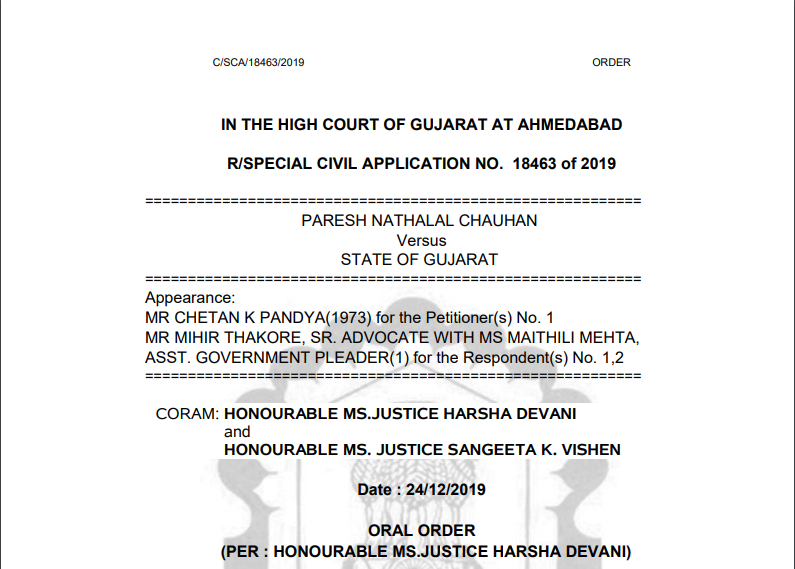Stay at taxpayers premise without a law in place is violative of Article 21 of COI:PARESH NATHALAL CHAUHAN Versus STATE OF GUJARAT
Table of Contents
Case Covered: PARESH NATHALAL CHAUHAN Versus STATE OF GUJARAT
PARESH NATHALAL CHAUHAN
Versus
STATE OF GUJARAT
Important Facts of the Case:
- Section 67(2) gives the right to search and seize “goods liable to confiscation or any documents or books or things”. But in this case family members were questioned for 8 days. This right is not given by the CGST Act to the officers.
- Under section 70 of the CGST Act, they had the right to summon them for questioning.
- There is no provision in GST for such prolonged investigation.
- The act of officers is violative of Article 21 of the Constitution of India. It provides for the right to privacy.
Important case covering the right under article 21 of the Constitution of India. The officers from the department resided for 8 days at taxpayers’ premises. It was not covered by any provision of GST as such. The verdict given by Honourable court is important as it states that it is against the right under article 21 of COI.
Important discussion in the proceedings:
Section 67(2) of CGST Act read with section 161 of criminal procedure:
“section (2) of section 67 of the GST Acts empowers the proper officer to search and seize goods, documents, books or things secreted at a place. Thus, an authorization is issued qua a place and not a person. Referring to subsection (10) of section 67 of the GST Acts, it was pointed out that the same provides that the provisions of the Code of Criminal Procedure, 1973 (hereinafter referred to as “the Code”) relating to search and seizure apply to search and seizure under that section. Reference was made to the provisions relating to search and seizure as provided in the Code, to submit that the officers concerned had resorted to the powers of search and seizure as contained therein. Insofar as the statements of the members residing in the searched premises are concerned, reference was made to section 161 of the Code. “
Download copy of the order:
Observation of Honourable Gujrat High Court:
28. Lastly the court may sound a word of caution to the authorities exercising powers under the GST Acts. Subsection (2) of section 157 of the Page 73 of 75 C/SCA/18463/2019 ORDER GST Acts says that no suit, prosecution or other legal proceedings shall lie against any officer appointed or authorised under the Act for anything which is done or intended to be done in good faith under the Act or the rules made thereunder. An action like the present one which is not contemplated under any statutory provision and which infringes the fundamental rights of citizens under article 21 of the Constitution of India may not be protected under this section. An action taken may be said to be in good faith if the officer is otherwise so empowered and he exceeds the scope of his authority. However, in a case like the present one where the authorisation was for search and seizure of goods liable to confiscation, documents, books or things and the concerned officer converted it into a search for a person and an investigation, which is not otherwise backed by any statutory provision, it may be difficult to accept that such action was in good faith. Protection of such action under section 157 of the GST Acts may unleash a regime of terror insofar as the taxable persons are concerned. 29. It is clarified that this court does not condone any alleged illegal acts on the part of the petitioner and in case he has indulged in any illegalities, the law should take its own course. Page 74 of 75 C/SCA/18463/2019 ORDER However, the court found it necessary to pass the present order to curb any further abuse of powers in this manner by the authorities under the GST Acts. 30. Before parting, this court would like to record its deep appreciation for the extremely valuable assistance provided by Mr. Tushar Hemani, the learned amicus curiae. 31. Let the matter be listed for hearing on merits on 23.01.2020
 CA Shafaly Girdharwal
CA Shafaly Girdharwal
CA
New Delhi, India
CA Shaifaly Girdharwal is a GST consultant, Author, Trainer and a famous You tuber. She has taken many seminars on various topics of GST. She is Partner at Ashu Dalmia & Associates and heading the Indirect Tax department. She has authored a book on GST published by Taxmann.









